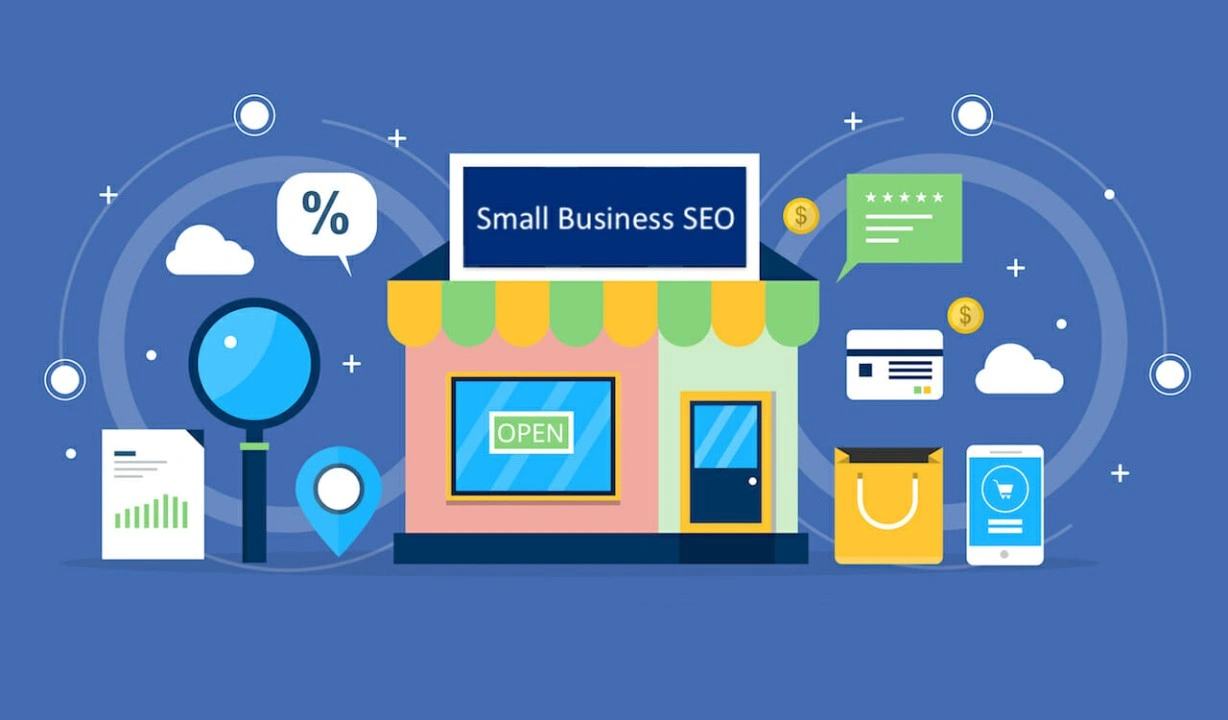Why Small Businesses Skip SEO (And Why They Shouldn't)

Small business owners often skip SEO, thinking it's too expensive, too complicated, or won't deliver results fast enough. This mindset costs them valuable customers who are searching online for their products and services every single day. This guide is for small business owners, entrepreneurs, and marketing managers who want to understand why investing in small business SEO makes financial sense, even with limited budgets and resources.
We'll explore the real reasons why small businesses avoid SEO and why these concerns often miss the bigger picture. You'll discover the hidden costs of poor online visibility and learn practical, affordable SEO solutions that won't drain your budget. We'll also show you simple ways to measure SEO ROI so you know your efforts are paying off.
Ready to see exactly where your business can start winning? Get a clear, custom roadmap now: Request your free SEO audit from Appear Online.
Common Reasons Small Businesses Avoid SEO
Limited Budget Constraints and Competing Priorities
Money talks, and for most small businesses, it's saying "prioritise what pays today." When you're running a tight ship with limited resources, SEO often gets pushed to the back burner. Small business owners find themselves juggling rent, payroll, inventory, and immediate marketing needs that promise quick returns.
The reality hits hard when business owners compare SEO costs to other marketing options. A single month of professional SEO services might cost the same as several weeks of social media ads that deliver instant traffic. This creates a natural bias toward tactics that show immediate results rather than investing in long-term small business SEO strategies.
Many entrepreneurs also struggle with the "invisible" nature of SEO investments. Unlike buying new equipment or hiring staff, SEO doesn't create something you can physically touch or see working right away. This makes it harder to justify the expense when cash flow is tight and every pound needs to count.
.webp)
Lack of Technical Knowledge and Expertise
SEO feels like learning a foreign language to most small business owners. Terms like "meta descriptions," "canonical tags," and "schema markup" sound more like computer programming than marketing. This technical barrier creates an intimidation factor that keeps many businesses from even attempting DIY SEO tips.
The learning curve appears steep and overwhelming. Business owners worry they'll waste time trying to figure out complex algorithms when they could be focusing on what they know best - running their actual business. This knowledge gap often leads to complete avoidance rather than seeking education or professional help.
Without understanding the basics, small businesses can't even evaluate whether SEO providers are offering legitimate services or just expensive snake oil. This uncertainty breeds mistrust and reinforces the decision to avoid SEO altogether.
Misconceptions About SEO Complexity and Time Requirements
Popular myths paint SEO as rocket science that requires years of study and constant maintenance. Many small business owners believe they need to become technical experts or hire expensive agencies to see any results. These misconceptions create unnecessary barriers to getting started with basic optimisation.
The "all or nothing" mentality stops businesses from taking simple first steps. Owners think they need perfect keyword research, flawless technical implementation, and professional content creation before SEO can work. In reality, even basic improvements to page titles, business listings, and content can boost small businesses' online visibility significantly.
Time expectations are often wildly unrealistic in both directions. Some expect overnight miracles, while others believe SEO takes years to show any results. Both extremes discourage action and prevent businesses from starting manageable, gradual improvement processes.
Preference for Immediate Results Over Long-Term Strategies
Small business owners live in survival mode, focusing on next month's bills rather than next year's growth. This short-term thinking makes SEO feel like a luxury they can't afford. When faced with choosing between a pay-per-click campaign that brings customers this week or SEO that might pay off in six months, the choice feels obvious.
The entrepreneurial mindset often favours control and quick pivots. SEO requires patience and consistency - qualities that feel risky when business conditions change rapidly. Owners prefer marketing channels they can turn on and off like a faucet rather than building something that takes time to mature.
This preference gets reinforced by cash flow realities. Immediate revenue from direct marketing helps pay today's bills, while SEO benefits feel abstract and distant. The gap between SEO investment and measurable returns creates anxiety that drives businesses toward more predictable marketing approaches.
Hidden Costs of Ignoring SEO
Lost Organic Traffic to Competitors
Your competitors aren't waiting around. While you're debating whether small business SEO is worth the investment, they're climbing search rankings and capturing customers who could be yours. Every day without SEO optimisation means potential customers are finding your competition instead of you when they search for products or services you offer.
Think about your own shopping behaviour. When you need something, you probably Google it and click on one of the first few results. If your business doesn't appear on that first page, you're invisible to those searchers. Your competitors who invested in SEO are collecting those clicks, leads, and sales that should be coming your way.
The gap widens over time. Search engines reward websites that consistently publish quality content and maintain good SEO practices. Businesses that start early build momentum, while those who wait face steeper uphill battles to catch up.
Higher Customer Acquisition Costs Through Paid Advertising
Skipping SEO forces you to rely heavily on paid advertising to get discovered online. While pay-per-click ads can bring immediate results, they come with ongoing costs that add up quickly. Every click costs money, and the spending never stops.
Organic search results from SEO work differently. Once you rank well for relevant keywords, those clicks are essentially free. You've already invested in the content and optimisation work upfront. A blog post that ranks well can drive traffic for months or years without additional advertising spend.
Small businesses often find themselves trapped in expensive advertising cycles. Google Ads, Facebook ads, and other paid channels demand constant budget allocation. When money gets tight, traffic disappears immediately. SEO provides a more sustainable foundation for online visibility that doesn't vanish when marketing budgets get cut.
The math is striking: businesses that ignore SEO often pay 3-5 times more per customer acquisition compared to those with a strong organic search presence.
.webp)
Reduced Brand Visibility and Credibility
When potential customers can't find you in search results, it creates doubt about your business's legitimacy and market presence. People associate higher search rankings with industry authority and trustworthiness. Being absent from search results suggests you might be out of business, inexperienced, or simply not a major player in your field.
Local SEO for small businesses becomes especially critical. When someone searches "plumber near me" or "best pizza in [city]," not appearing in those local results means losing customers to competitors who do show up. These local searches often have high purchase intent, making the missed opportunities particularly costly.
Your digital footprint reflects your business credibility. Customers research businesses online before making purchases, and poor online visibility creates negative first impressions. Strong SEO presence builds confidence and positions your small business as a professional, established option worth considering.
SEO Benefits That Drive Small Business Growth
Increased local search visibility for nearby customers
Small businesses thrive on local customers, and local SEO for small business becomes the bridge connecting you with people actively searching for your services right in your neighbourhood. When someone types "pizza near me" or "plumber in downtown," Google shows businesses that have optimised their local presence. This means claiming and optimising your Google My Business profile, gathering genuine customer reviews, and ensuring your business information stays consistent across online directories.
The beauty of local search visibility lies in its precision. Unlike traditional advertising that casts a wide net, local SEO targets people who are ready to buy and can physically visit your store. A bakery in Portland doesn't need customers from Miami – they need the family planning a birthday party three blocks away. This targeted approach makes every dollar spent on small business SEO work harder and deliver better results.
Cost-effective lead generation compared to traditional marketing
Traditional marketing channels like radio ads, newspaper placements, or billboards require significant upfront investments with no guarantee of reaching interested customers. Affordable SEO solutions flip this model entirely. Instead of interrupting people with your message, SEO positions your business exactly where potential customers are already looking for solutions.
Consider the numbers: a single newspaper ad might cost £500 for one day's exposure, while that same budget invested in SEO content and optimisation can generate leads for months or even years. The compound effect makes SEO particularly attractive for small business digital marketing budgets. Each blog post, optimised webpage, or local directory listing continues working around the clock, attracting new customers while you sleep.
Search engine optimisation also provides measurable results that traditional marketing often can't match. You can track exactly which keywords brought visitors, how many converted to customers, and calculate your return on investment with precision.
Building long-term brand authority and trust
Search engines reward businesses that consistently provide valuable content and positive user experiences. When your website regularly appears in search results for relevant queries, customers begin recognising your brand as a trusted authority in your field. This recognition doesn't happen overnight, but the cumulative effect builds powerful brand equity.
Customer reviews, detailed service pages, and helpful blog content all contribute to this authority. A local HVAC company that publishes seasonal maintenance tips and troubleshooting guides demonstrates expertise beyond just selling services. This educational approach builds trust before the first phone call, making potential customers more likely to choose your business over competitors.
Brand authority also creates a protective moat around your business. When customers already know and trust your brand through search results, they're less likely to comparison shop with competitors, reducing price-based competition.
Better user experience leading to higher conversion rates
SEO best practices naturally improve website usability, creating a win-win scenario where both search engines and visitors benefit. Fast-loading pages, mobile-friendly designs, and clear navigation structures that help with search rankings also make it easier for customers to find information and make purchases.
When someone searches for "emergency locksmith," they want immediate answers: phone number, service area, and availability. An SEO-optimised website delivers this information quickly and clearly, removing friction from the customer journey. This streamlined experience directly impacts conversion rates – more visitors become paying customers.
The technical aspects of SEO, like improving site speed and fixing broken links, eliminate frustrating obstacles that cause potential customers to leave for competitor websites. Every second saved in page load time and every click reduced in the purchase process translates to more sales.
Sustainable competitive advantage over time
Unlike paid advertising that stops generating leads the moment you stop paying, SEO builds lasting value that compounds over time. The content you create today, the backlinks you earn, and the search rankings you achieve become digital assets that continue delivering results for years.
This sustainability gives small businesses a unique opportunity to compete with larger companies that might outspend them on advertising. A well-executed SEO strategy allows a local business to outrank national chains for relevant local searches, levelling the competitive playing field.
The long-term nature of SEO also means early investment pays dividends. Businesses that start their small business online visibility efforts today will have significant advantages over competitors who wait to begin their SEO journey. Search engine trust and authority build slowly but create substantial barriers for newcomers trying to compete in established markets.
Practical SEO Solutions for Resource-Constrained Businesses
Start with basic on-page optimisation techniques
Getting started with small business SEO doesn't require a massive budget or technical expertise. Begin by optimising your website's title tags and meta descriptions for each page. These elements appear in search results and directly impact click-through rates. Include your primary keywords naturally while making descriptions compelling enough to entice clicks.
Header tags (H1, H2, H3) provide structure that search engines love. Use one H1 tag per page with your main keyword, then organise content with H2 and H3 tags that include related terms. Internal linking between your pages helps search engines understand your site's structure while keeping visitors engaged longer.
Image optimisation often gets overlooked but delivers quick wins. Compress images to improve page speed, add descriptive alt text with relevant keywords, and use proper file names instead of generic camera labels like "IMG_1234.jpg."
Page speed matters tremendously for both user experience and rankings. Simple fixes like enabling browser caching, choosing a reliable hosting provider, and minimising plugins can dramatically improve load times without technical skills.
Focus on local SEO for immediate community impact
Local SEO for small businesses creates the fastest path to visibility within your community. Start by claiming and optimising your Google Business Profile - it's free and shows up prominently when people search for businesses like yours nearby.
Consistency across all online directories builds trust with search engines. Make sure your business name, address, and phone number (NAP) match exactly across Google, Yelp, Facebook, and industry-specific directories. Even small discrepancies can hurt your local rankings.
Customer reviews drive local search success. Actively encourage satisfied customers to leave reviews on Google and other platforms. Respond to all reviews professionally, showing potential customers that you care about their experience.
Local content creation sets you apart from competitors. Write blog posts about community events, local partnerships, or neighbourhood-specific problems your business solves. This content signals to search engines that you're genuinely connected to your area.
.webp)
Leverage free and affordable SEO tools
Expensive SEO software isn't necessary when you're starting out. Google provides powerful free tools that rival premium alternatives. Google Analytics shows how people find and use your website, while Google Search Console reveals which keywords bring traffic and identifies technical issues.
Google Keyword Planner helps discover what your customers actually search for, though you'll need a Google Ads account to access detailed data. Ubersuggest and Also Asked offer keyword research capabilities with generous free tiers.
For affordable SEO solutions under £100 monthly, consider tools like SEMrush or Ahrefs' starter plans. These provide competitor analysis, keyword tracking, and content ideas that would cost thousands if outsourced to agencies.
Browser extensions like MozBar and Keywords Everywhere provide instant SEO insights while browsing. These tools show domain authority, keyword difficulty, and search volumes directly in your browser, making research effortless.
Create valuable content that addresses customer needs
Content creation doesn't mean churning out blog posts nobody reads. Start by listening to your customers' actual questions and pain points. Document the problems you solve daily, then create content around those real situations.
FAQ pages rank incredibly well because they match how people search. Transform your most common customer service inquiries into detailed answers that include relevant keywords naturally. This content serves dual purposes - helping customers and improving search rankings.
Video content increasingly dominates search results, especially for local businesses. Simple smartphone videos showing your products, services, or behind-the-scenes operations often outperform expensive professional content. YouTube acts as the second-largest search engine, making video SEO crucial for small business online visibility.
Seasonal and timely content captures search traffic when competitors aren't paying attention. Plan content around holidays, industry events, or local happenings relevant to your business. A tax service writing about tax deadline reminders or a landscaper discussing spring cleanup tips naturally attracts targeted traffic.
Long-form content (1,500+ words) typically ranks better than short articles, but quality trumps length. One comprehensive guide that thoroughly answers customer questions beats five shallow posts that barely scratch the surface.
Measuring SEO Success Without Breaking the Bank
Track Key Metrics That Matter for Small Businesses
Small businesses don't need to monitor dozens of complex SEO metrics to understand their progress. Focus on five essential measurements that directly impact your bottom line: organic traffic growth, keyword rankings for your core services, conversion rates from search visitors, local search visibility, and customer inquiry volume.
Start by tracking organic traffic month-over-month. A steady increase indicates your small business SEO efforts are working. Don't obsess over daily fluctuations – look for consistent upward trends over 3-6 month periods. Pair this with conversion tracking to see which visitors actually become customers.
Monitor your rankings for 10-15 primary keywords related to your business. Tools like Google's rank checker or free alternatives can show where you appear for searches like "plumber near me" or "best pizza downtown." Small improvements in local rankings often translate to significant revenue increases.
Customer inquiries provide the clearest success indicator. Track phone calls, form submissions, and walk-in customers who mention finding you online. This direct feedback shows how SEO on a budget delivers real business results.
Use Google Analytics and Search Console Effectively
Google Analytics and Search Console offer everything small businesses need for measuring SEO ROI without additional costs. These free tools provide insights that expensive software delivers, making them perfect for affordable SEO solutions.
In Google Analytics, create custom segments for organic search traffic. Watch which pages attract the most visitors and identify content gaps. The "Acquisition" section shows exactly how people find your website, while "Behaviour" reveals what they do once they arrive.
Search Console shows which search queries bring visitors to your site. This goldmine of data helps optimise existing content and create new pages targeting relevant keywords. The "Performance" report displays click-through rates, helping you craft better meta descriptions and titles.
Set up goal tracking for actions that matter – newsletter signups, quote requests, or online purchases. This connects search visibility directly to business outcomes, making it easier to justify continued SEO investment.
.webp)
Monitor Local Ranking Improvements and Customer Inquiries
Local SEO for small business success depends heavily on geographic visibility. Track your Google Business Profile views, calls, direction requests, and website clicks through the insights dashboard. These metrics show real customer behaviour in your area.
Use simple spreadsheets to monitor local keyword rankings weekly. Search for terms like "[your service] + [your city]" from different devices and locations.
Connect ranking improvements to actual business results. When you climb from page two to position three for "dentist in Springfield," track whether phone calls and appointments increase. This correlation helps prove SEO value to sceptical business partners.
Document customer feedback about how they found you. Simple questions during initial consultations reveal whether your small business's online visibility efforts are working. Many customers will mention specific search terms or say they found you "at the top of Google," providing valuable success confirmation.
Create a monthly dashboard tracking website visitors, phone calls, new customer inquiries, and revenue from search-driven customers. This simple approach demonstrates clear connections between SEO activities and business growth.
Conclusion
The choice between investing in small business SEO and watching competitors dominate search results becomes clearer when you see the complete picture. Small businesses that embrace SEO on a budget don't just survive in the digital marketplace - they thrive by connecting with customers actively searching for their products and services.
Your business deserves the same online visibility that larger companies enjoy, and the path forward doesn't require a massive marketing budget or technical expertise. Starting with local SEO for small business strategies, optimising your Google Business Profile, and implementing basic DIY SEO tips can generate meaningful results within months, not years.
The hidden costs of avoiding SEO compound daily. Every search query your potential customers make without finding your business represents lost revenue, missed connections, and opportunities handed to competitors. Meanwhile, small business digital marketing through organic search provides long-term value that paid advertising simply cannot match.
Measuring SEO ROI becomes straightforward when you focus on affordable SEO solutions that track local rankings, website traffic, and customer inquiries. These metrics tell the real story of how small business online visibility translates into phone calls, foot traffic, and sales.
The businesses that will dominate their local markets tomorrow are making SEO investments today. They understand that ignoring search engine optimisation isn't saving money - it's costing them customers, credibility, and competitive advantage. Your small business can join them by taking the first step, whether that's claiming your online listings, researching keywords your customers use, or partnering with budget-friendly SEO professionals who understand your unique challenges and goals.
Many small business owners think SEO is too expensive, complicated, or time-consuming to tackle. They worry about upfront costs and technical jargon while their competitors quietly climb search rankings and capture more customers. What these businesses don't realise is that skipping SEO actually costs them more in the long run through missed opportunities and lost revenue.
The good news is that SEO doesn't have to drain your budget or require a computer science degree. Start with simple steps like optimising your Google Business Profile, creating helpful content for your customers, and tracking basic metrics like website visitors and phone calls.
References:
https://developers.google.com/search/docs/appearance/core-updates
https://keywordseverywhere.com/
https://moz.com/products/pro/seo-toolbar
.avif)




.webp)

.webp)

